Giáo án Tiếng Anh Lớp 7 - Chương trình cả năm - Trần Quốc Tuấn
I. Aims and requests: - After finishing the lesson, pupils will be able to:
+ Greet to everyone.
+ Say and introduce themselves.
+ Revise the present simple tense and comparatives.
II. Teaching processes:
1. Put the class into order.
2. Checking up of previous lesson.
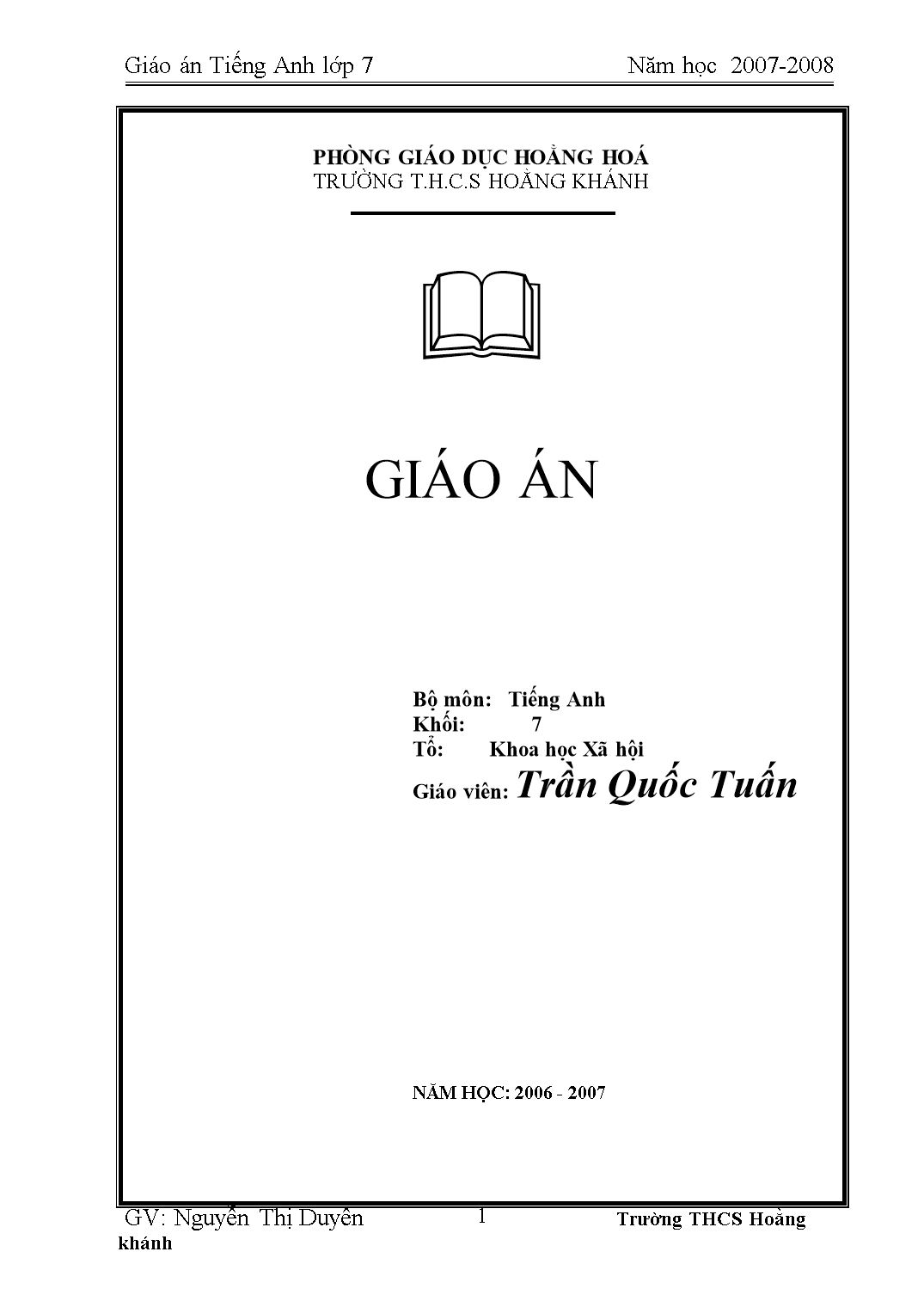
Trang 1
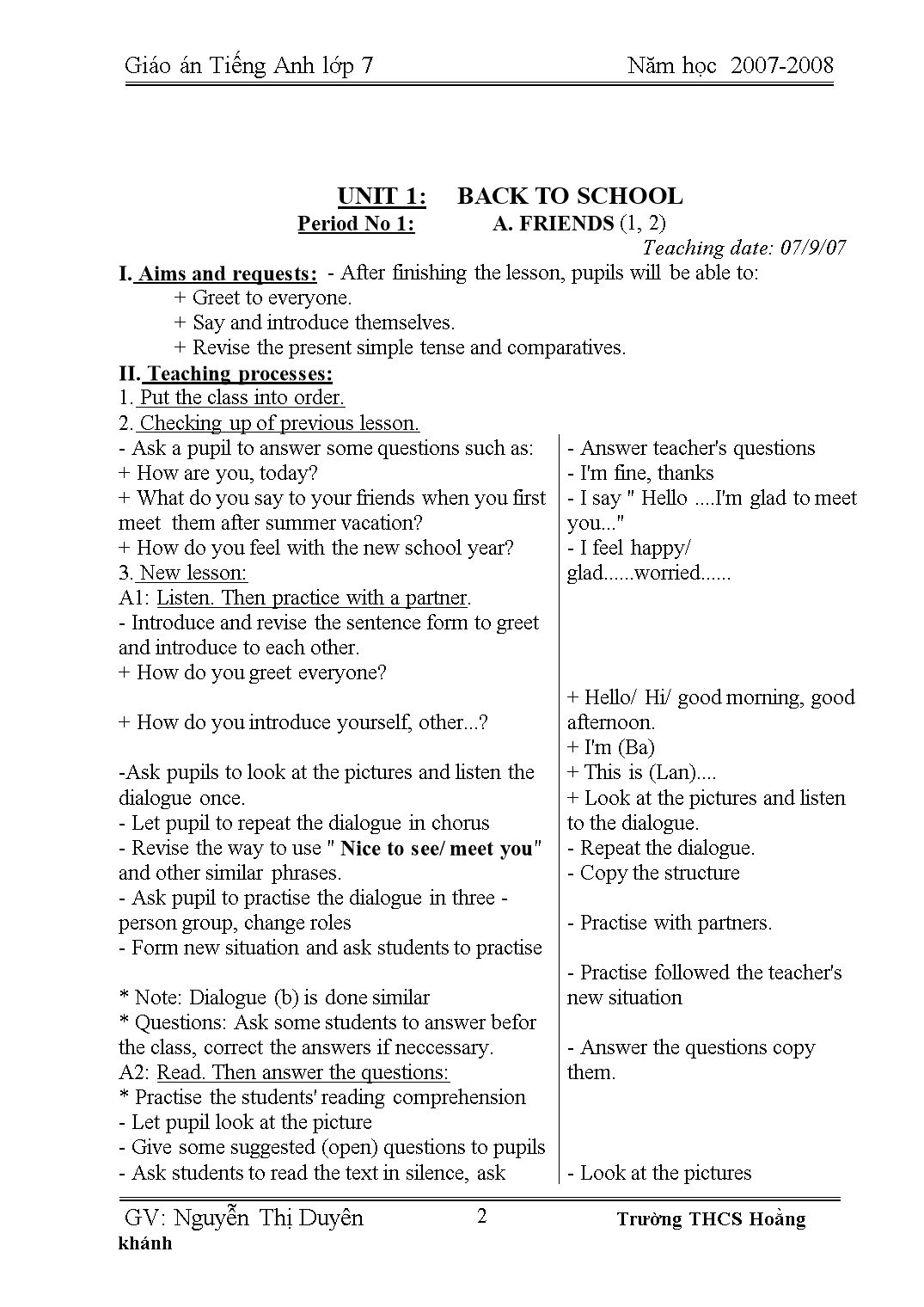
Trang 2
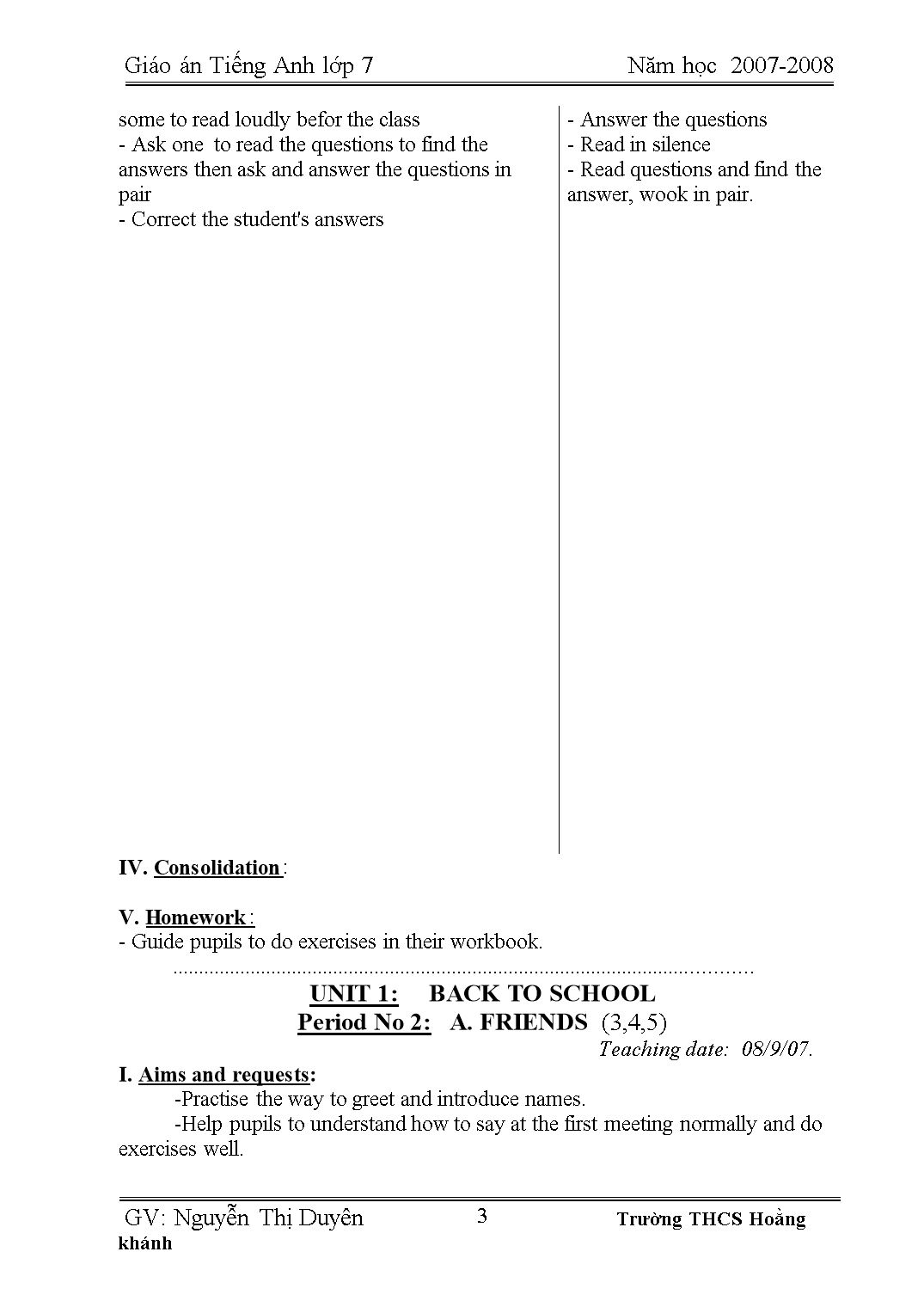
Trang 3
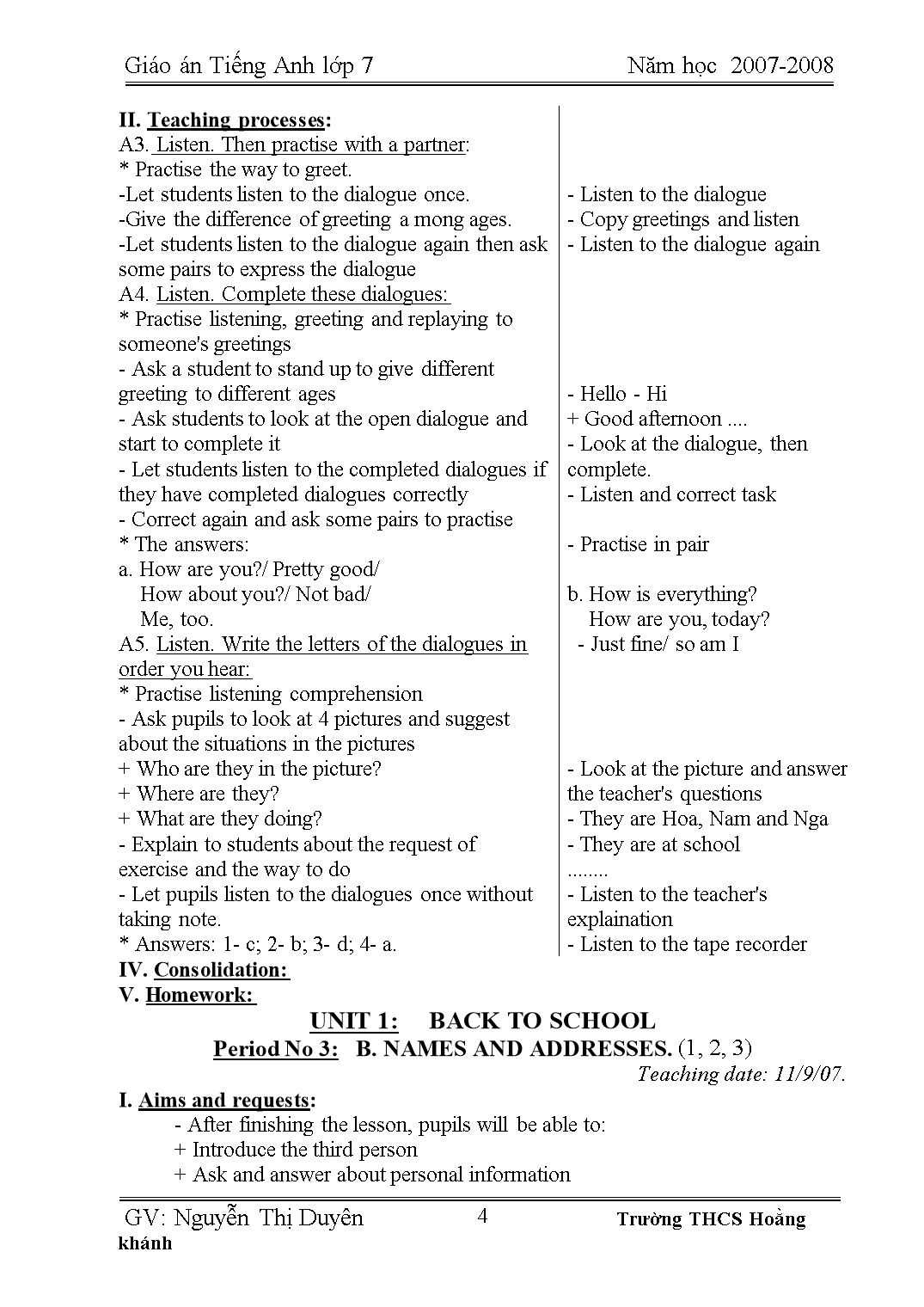
Trang 4
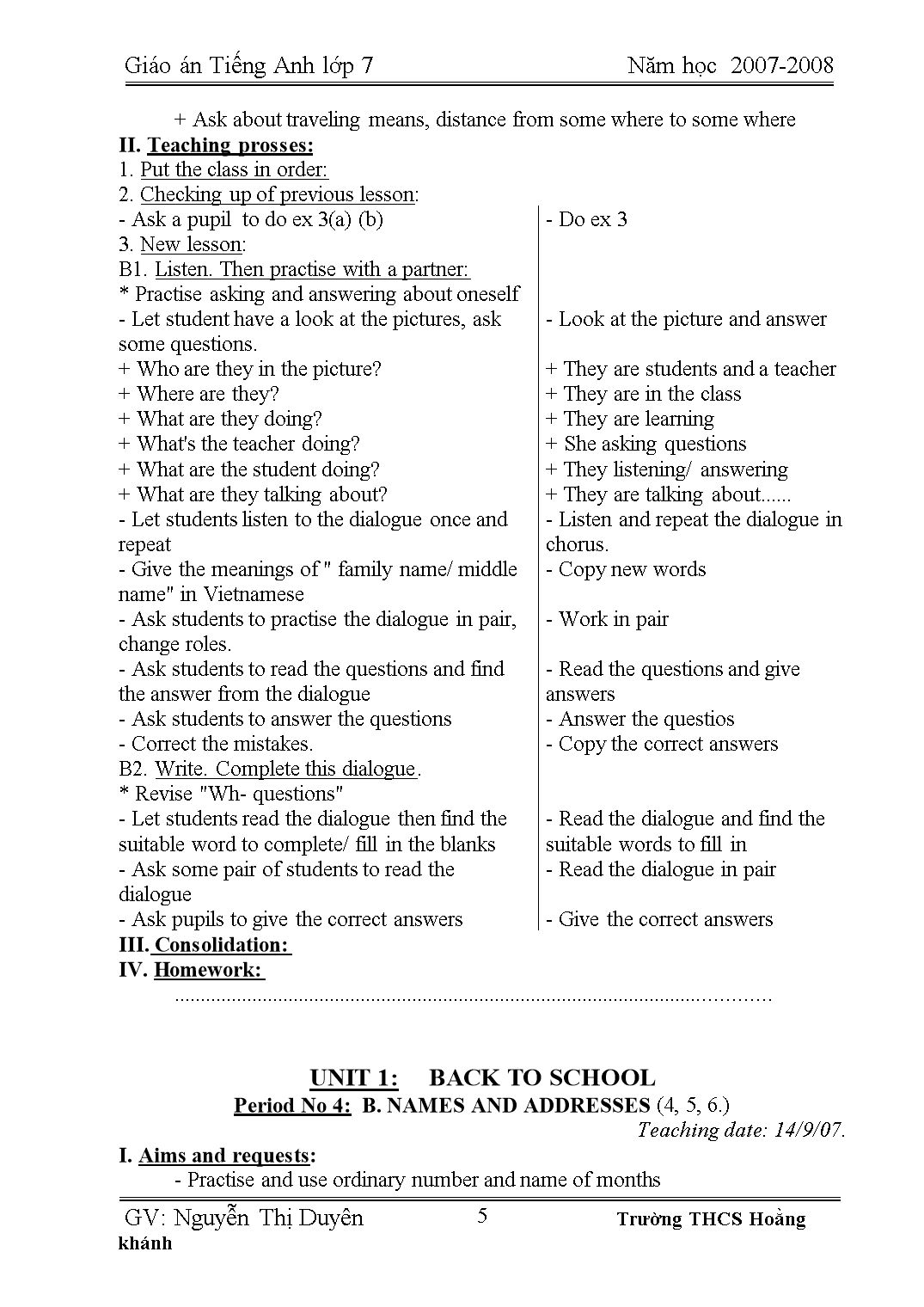
Trang 5
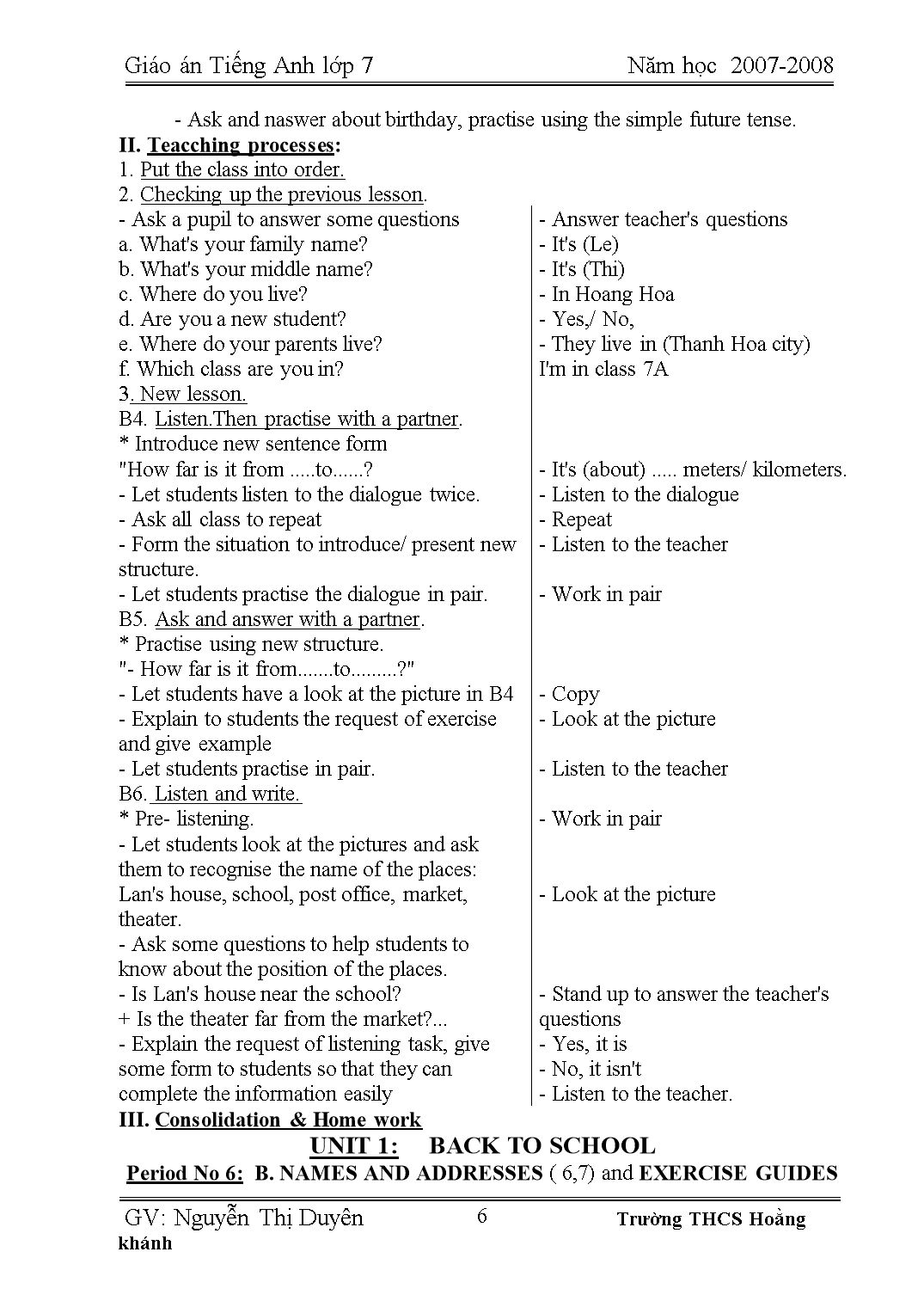
Trang 6
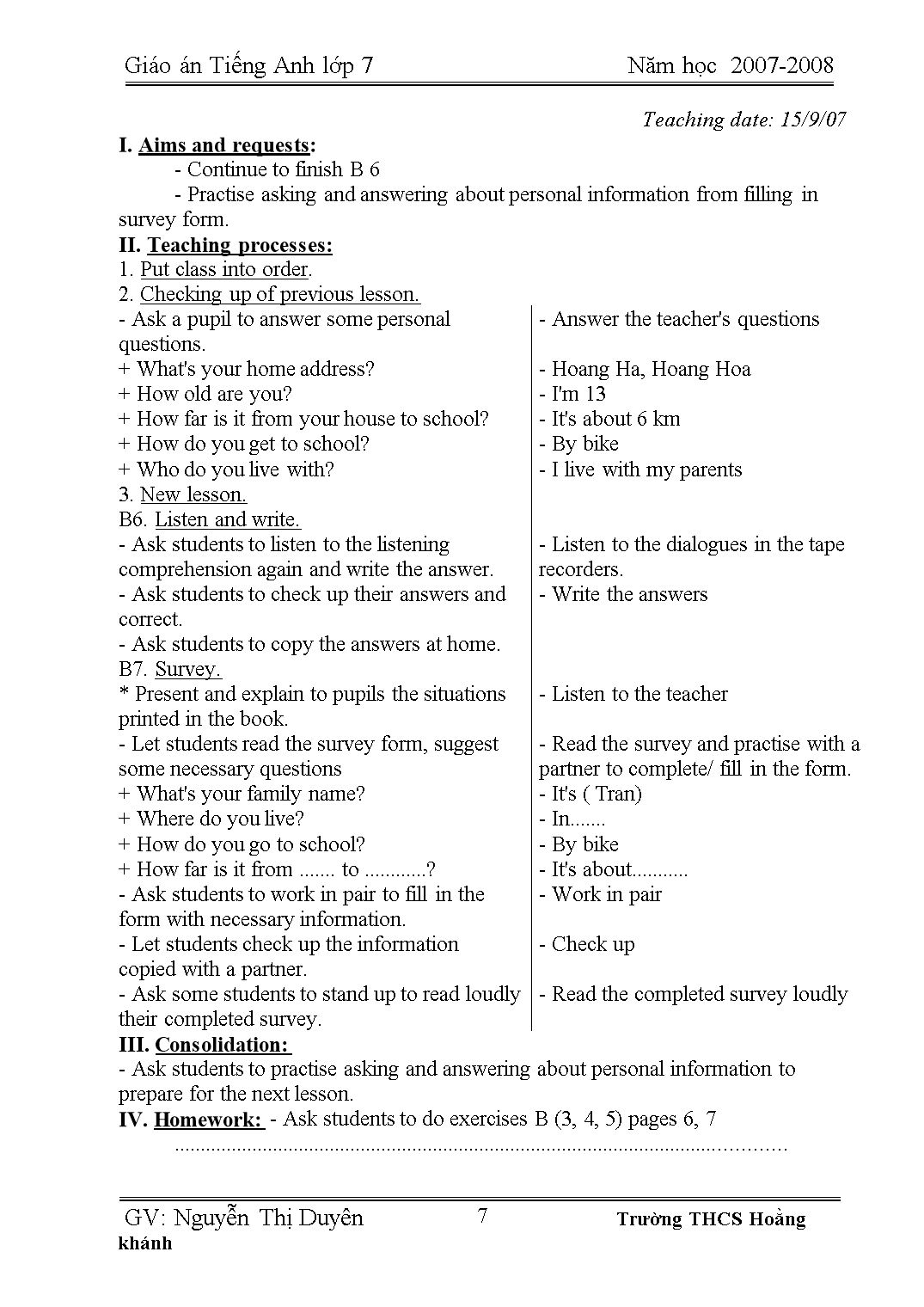
Trang 7
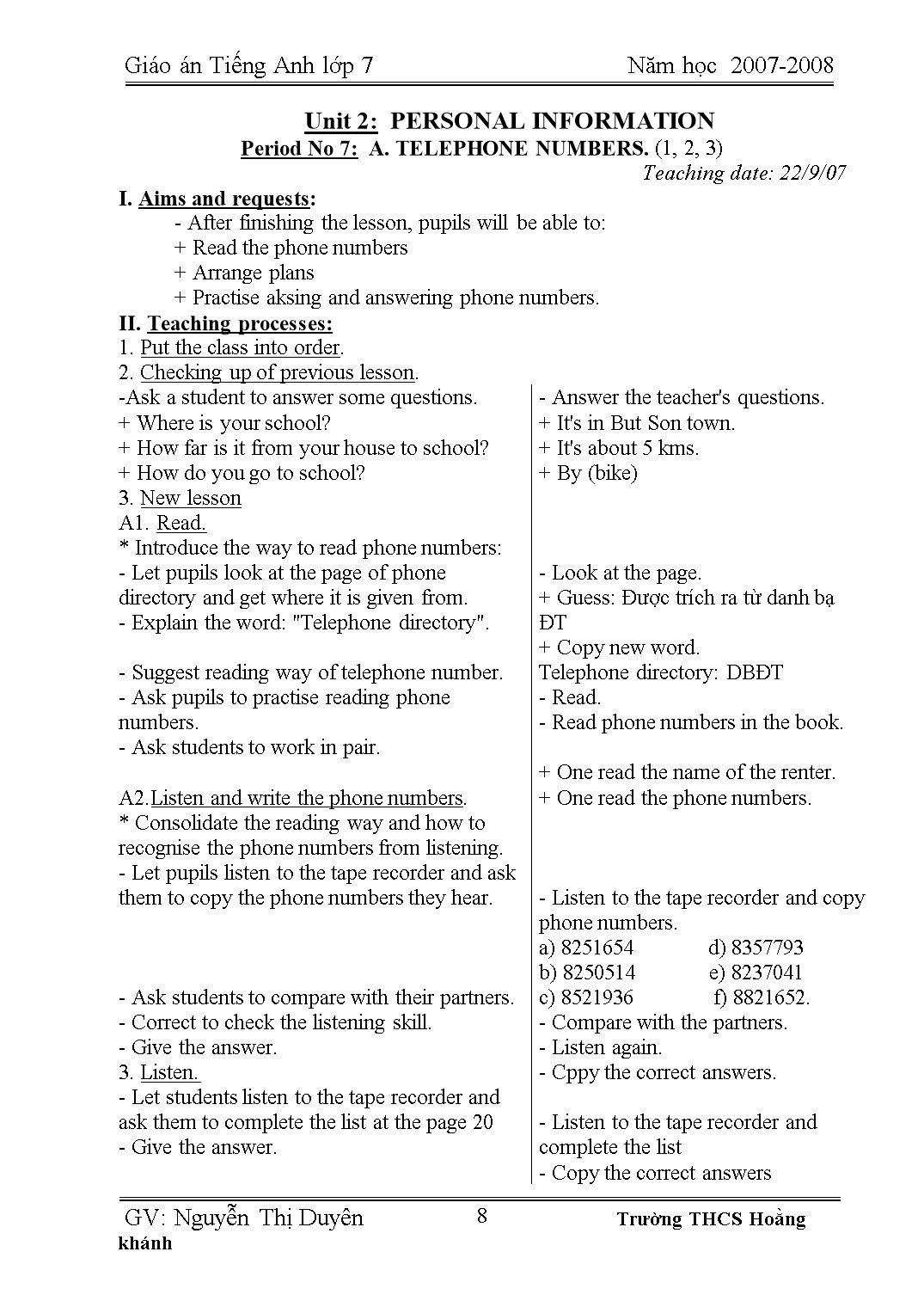
Trang 8
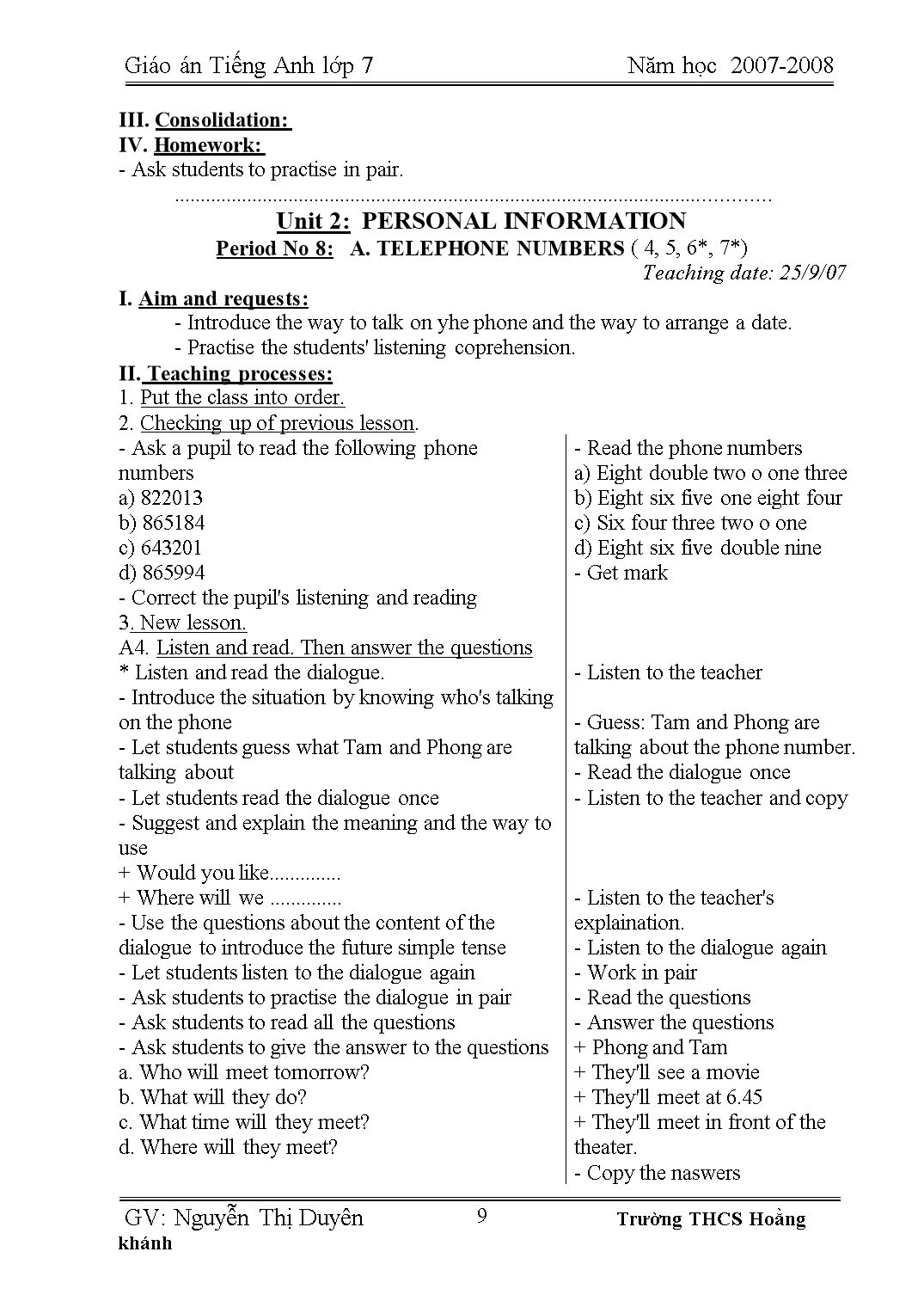
Trang 9
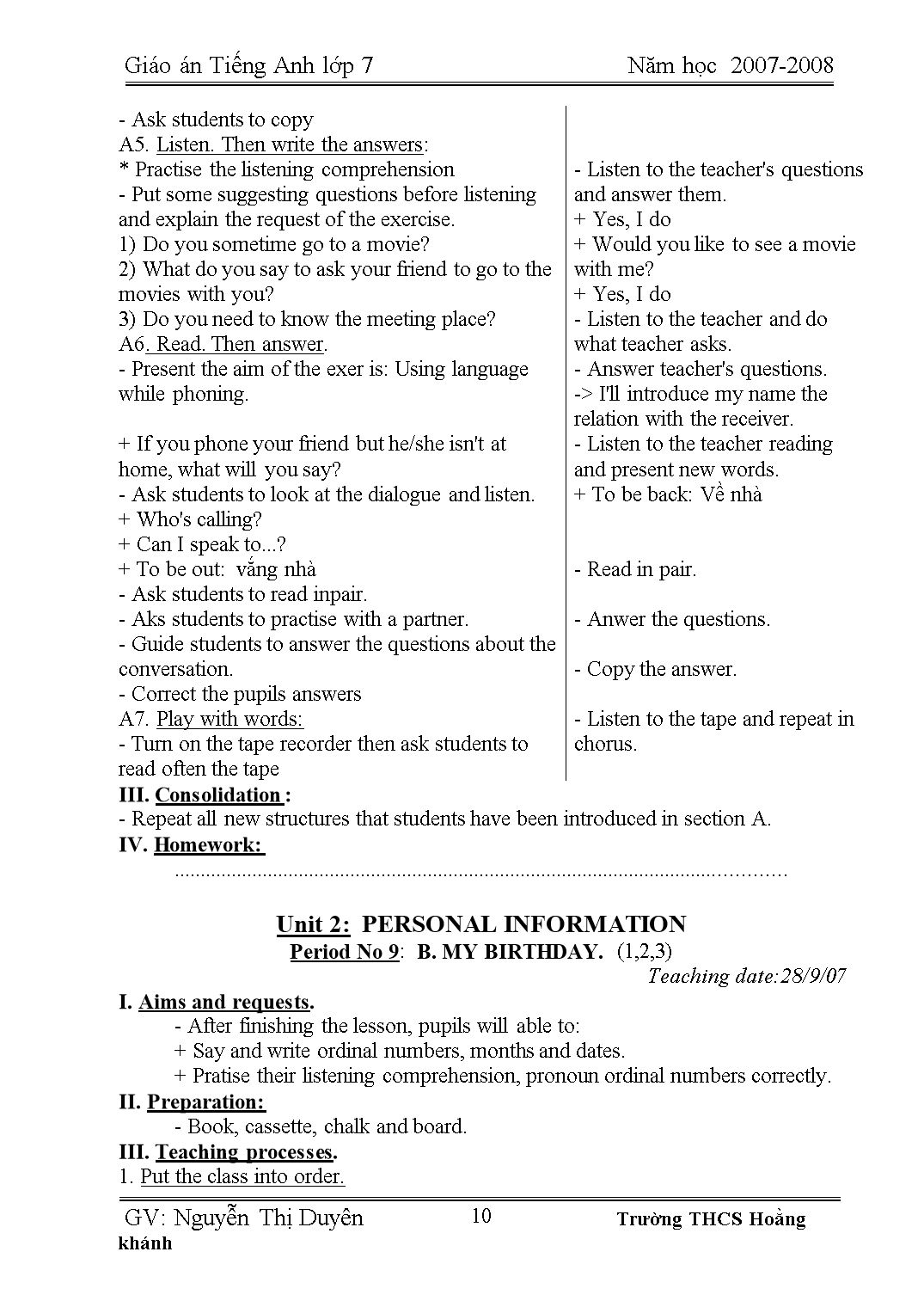
Trang 10
Tải về để xem bản đầy đủ
Bạn đang xem 10 trang mẫu của tài liệu "Giáo án Tiếng Anh Lớp 7 - Chương trình cả năm - Trần Quốc Tuấn", để tải tài liệu gốc về máy hãy click vào nút Download ở trên
Tóm tắt nội dung tài liệu: Giáo án Tiếng Anh Lớp 7 - Chương trình cả năm - Trần Quốc Tuấn
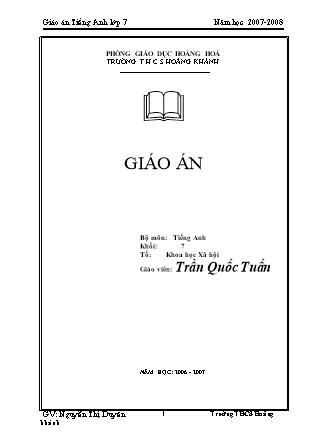
PHÒNG GIÁO DỤC HOẰNG HOÁ TRƯỜNG T.H.C.S HOẰNG KHÁNH & GIÁO ÁN Bộ môn: Tiếng Anh Khối: 7 Tổ: Khoa học Xã hội Giáo viên: Trần Quốc Tuấn NĂM HỌC: 2006 - 2007 UNIT 1: BACK TO SCHOOL Period No 1: A. FRIENDS (1, 2) Teaching date: 07/9/07 I. Aims and requests: - After finishing the lesson, pupils will be able to: + Greet to everyone. + Say and introduce themselves. + Revise the present simple tense and comparatives. II. Teaching processes: 1. Put the class into order. 2. Checking up of previous lesson. - Ask a pupil to answer some questions such as: + How are you, today? + What do you say to your friends when you first meet them after summer vacation? + How do you feel with the new school year? 3. New lesson: A1: Listen. Then practice with a partner. - Introduce and revise the sentence form to greet and introduce to each other. + How do you greet everyone? + How do you introduce yourself, other...? -Ask pupils to look at the pictures and listen the dialogue once. - Let pupil to repeat the dialogue in chorus - Revise the way to use " Nice to see/ meet you" and other similar phrases. - Ask pupil to practise the dialogue in three -person group, change roles - Form new situation and ask students to practise * Note: Dialogue (b) is done similar * Questions: Ask some students to answer befor the class, correct the answers if neccessary. A2: Read. Then answer the questions: * Practise the students' reading comprehension - Let pupil look at the picture - Give some suggested (open) questions to pupils - Ask students to read the text in silence, ask some to read loudly befor the class - Ask one to read the questions to find the answers then ask and answer the questions in pair - Correct the student's answers - Answer teacher's questions - I'm fine, thanks - I say " Hello ....I'm glad to meet you..." - I feel happy/ glad......worried...... + Hello/ Hi/ good morning, good afternoon. + I'm (Ba) + This is (Lan).... + Look at the pictures and listen to the dialogue. - Repeat the dialogue. - Copy the structure - Practise with partners. - Practise followed the teacher's new situation - Answer the questions copy them. - Look at the pictures - Answer the questions - Read in silence - Read questions and find the answer, wook in pair. IV. Consolidation: V. Homework: - Guide pupils to do exercises in their workbook. ............................................................................................................... UNIT 1: BACK TO SCHOOL Period No 2: A. FRIENDS (3,4,5) Teaching date: 08/9/07. I. Aims and requests: -Practise the way to greet and introduce names. -Help pupils to understand how to say at the first meeting normally and do exercises well. II. Teaching processes: A3. Listen. Then practise with a partner: * Practise the way to greet. -Let students listen to the dialogue once. -Give the difference of greeting a mong ages. -Let students listen to the dialogue again then ask some pairs to express the dialogue A4. Listen. Complete these dialogues: * Practise listening, greeting and replaying to someone's greetings - Ask a student to stand up to give different greeting to different ages - Ask students to look at the open dialogue and start to complete it - Let students listen to the completed dialogues if they have completed dialogues correctly - Correct again and ask some pairs to practise * The answers: a. How are you?/ Pretty good/ How about you?/ Not bad/ Me, too. A5. Listen. Write the letters of the dialogues in order you hear: * Practise listening comprehension - Ask pupils to look at 4 pictures and suggest about the situations in the pictures + Who are they in the picture? + Where are they? + What are they doing? - Explain to students about the request of exercise and the way to do - Let pupils listen to the dialogues once without taking note. * Answers: 1- c; 2- b; 3- d; 4- a. - Listen to the dialogue - Copy greetings and listen - Listen to the dialogue again - Hello - Hi + Good afternoon .... - Look at the dialogue, then complete. - Listen and correct task - Practise in pair b. How is everything? How are you, today? - Just fine/ so am I - Look at the picture and answer the teacher's questions - They are Hoa, Nam and Nga - They are at school ........ - Listen to the teacher's explaination - Listen to the tape recorder IV. Consolidation: V. Homework: UNIT 1: BACK TO SCHOOL Period No 3: B. NAMES AND ADDRESSES. (1, 2, 3) Teaching date: 11/9/07. I. Aims and requests: - After finishing the lesson, pupils will be able to: + Introduce the third person + Ask and answer about personal information + Ask about traveling means, distance from some where to some where II. Teaching prosses: 1. Put the class in order: 2. Checking up of previous lesson: - Ask a pupil to do ex 3(a) (b) 3. New lesson: B1. Listen. Then practise with a partner: * Practise asking and answering about oneself - L ... s a. Teenagers like to listen to the latest pop music and see the shows of their favorite artists. b. They are students, workers or family members. c. Most imports include police and hospital series. d. I like to see “The peak to the Olympia”, films, music, newsreel, documents.. - Write the answers in book. 1. around; 6. like 2. watch 7. station 3. listen 8. receive 4. series 9. cities 5. show 10. possible - Read aloud - Write the passage in book. - Take notes. Period No 91: WRITTEN TEST 45' Teaching date:........................ I. Em hãy hoàn thành các câu nói về Tivi ở Việt Nam nhiều năm trước. Dùng các từ trong khung: ( 2.5 điểm). black went popular through white gathered very until inside brought few very outside closed had 1. Many years ago .. people ... a TV set. 2. The owners of TVs were . .. . 3. There were only .. and . TV programs. 4. The neighbors .. both .. and . the TV owner’s house. They watched . the window. 5. No one .. home . the TV station . for the night. II. Em hãy chọn điền “ may, should, must, will, shouldn’t, mustn’t ” vào mỗi chỗ trống thích hợp để hoàn thành những câu sau: ( 4.5 điểm). 1. You .... believe everything you read in the newspapers. 2. It’s raining. You ... take an umbrellar. 3. Excuse me, but . I ask you something personal? 4. You . be blind if you can see that sign! 5. Listen. I .. be late this evening. so don’t wait for me. 6. If you see Hoa, .. you give her this message? 7. Before the plane lands, the “No Smoking” sign .. come on. 8. When the “No Smoking” sign comes on, you stop smoking. 9. The train .. be here in a few minutes, but you never know. III. Em hãy sắp xếp những câu sau thành một bài hội thoại hợp lí: (3.0 điểm). 1/______ 2/______ 3/______ 4/______ 5/______ 6/______ A. Then he turned and shot. B. Hong Son passed the ball to Huynh Duc. C. Huynh Duc kicked over their heads and dashed between them. D. Huynh Duc ran towards and kicked it down the left wing. E. It was a goal, and the score was 3 - 2. F. Two players on Thailand team ran towards him. The answer keys: I. 1. very - few - had 2. very - popular 3. black - white 4. gathered - inside - outside - through 5. went - until - closed II. 1. shouldn’t; 2. should; 3. may; 4. must; 5. may; 6. will; 7. will; 8. must; 9. will; III. 1/___B___ 2/___D___ 3/___F___ 4/___C___ 5/___A___ 6/___E___ A. Then he turned and shot. B. Hong Son passed the ball to Huynh Duc. C. Huynh Duc kicked over their heads and dashed between them. D. Huynh Duc ran towards and kicked it down the left wing. E. It was a goal, and the score was 3 - 2. F. Two players on Thailand team ran towards him. UNIT 15: GOING OUT Period No 92: A. VIDEO GAMES (1) Teaching date:........................ I. Objects: - By the end of the lesson, Ss will be able to give advice and response about Videogames. Moreover, they can practise more about modal verbs. II. Teaching aids: - Pictures, the tape, the stereo. III. Teaching process: Teacher’s work * Warm-up: * Check up the pre-lesson: * New lesson: 1. Listen. Then practice: Set the scene. - What can you see in the picture? - Are there any amusement centers in your neighborhood, town, village? - What are they? - Do you often go to an amusement center? - What can you see there? - Now listen to the dialogue between Nam and Lan who are talking about Videogames. New words: amusement center, addictive (a) , arcade, - Ask them to practice in pairs. - Take notes: giving advice. - Give the form: Don’t + V + . Ex: Don’t watch TV too much. - Ask them to answer the questions in book. - Let them to practice in pairs. a. Where is Nam going? b. What is he going to do? c. How often does he go? d. Does he spend a lot of money? e. How long does he usually stay? f. Why must Nam be carefully? g. What will Nam do later? 2. Homework: - Learn new words. - Do exercises in book. Students’ work Answer - It is amusement center. - Yes, there are. -They are Videogames store, Yahoo @. com; hot mail @. com, website, www - Not often. - Parks, lake. - Listen to the tape. - Write down. - Listen and repeat. - Practice in pairs. - Don’t spend too much of your time. - Don’t worry, I won’t. - You must be careful. - Answer questions. - Practice in pairs. Answer. a. He is going to the amusement center. b. He is going to play Videogames. c. Not often, about once a week. d. No, he doesn’t. e. For about an hour. f. Because games can addictive. g. He’ll do his homework. - Take notes. UNIT 15: GOING OUT Period No 93: A. VIDEO GAMES (2) Teaching date:........................ I. Objects: - By the end of the lesson, Ss will be able to understand clearly about Videogames and their disadvantages and advantages. II. Teaching aids: - Pictures, the tape, the stereo. III. Teaching process: Teacher’s work * Warm-up: * Check up the pre-lesson: * New lesson: 2. Listen and read: - Do you often play Videogames? - How often? - How long do you usually stay there? - Do you often take part in outdoor activities? - Let them listen to the tape? - Ask them to read aloud. - New vocabulary: inventors, as young as dizzy (a), play outdoors, develop, social skill, own age. - Now, answer. Complete the sentences. 3. Complete the passage with the words given in the box: - Set the scene. This text is about cameras and. New vocabulary: show, identify, protect, premises, robbery, robbers, education. aid, university courses, industry, worldwide, images, same. - Now ask them to complete the passage. - Check and correct. - Ask them to read aloud. 4. Homework: - Learn by heart new words. - Do exercises in book. Students’ work - Yes, I do. - Twice a week. - About an hour. - Yes, I do. - Listen to the tape. - Read aloud. - Write down. - Listen and repeat. a - D. play; b - A. become; c - D. all; d - B. little time; Listen. Write down new words Listen and repeat. - Use Rub out and RT. 1. be; 2. have; 3. is; 4. identify; 5. are; 6. use; 7. can; 8. will; 9. buy; 10. show. - Take notes. .......................................................................................................... UNIT 15: GOING OUT Period No 94: B. IN THE CITY (1) Teaching date:........................ I. Objects: - By the end of the lesson, Ss will be able to review about something people like or dislike. Moreover, they can talk about hobbies in the past. II. Teaching aids: - Pictures, the tape, the stereo. III. Teaching process: Teacher’s work * Warm-up: * Check up the pre-lesson: * New lesson: 1. Listen. Then practice: Set the scene. Is it in the city or in the country? Do you like to live in a city or in the country? Why don’t you like living in the city? or what is different from the country and the city? - Now ask them to listen to the tape between Lan and Hoa. - Ask them to practice in pairs. New vocabulary: get to know, the noise keep me awake, direction, get used to do sth rest, neighborhood. - Ask them to answer the questions in book. - Practice in pairs. - Check and correct. a. What does Hoa do in the evening? b. Does she like the city? c. Where did she live before? d. Why did she like living there? e. Why doesn’t she like the city? f. What does Hoa dislike most about the city? Why? 2. Homework: - Learn new words. - Do exercises in book. - Make sentences using “like” or “dislike”. Students’ work Answer It is in the city. I like to live in a country. I hate the noise, busy road, polluted air; people are not friendly - Listen to the tape. - Practice in pairs. - Write down. - Listen and repeat. - Answer questions in book. - Practice in pairs. - She goes to school theater once a week and usually stay at home. - No, she doesn’t. - She lived in a village near Hue. - Because the village was quiet and there was only a little traffic (she knew all the people). - Because she hates the noise and busy reads here. - She hates crossing the road most-Because they scare her. - Takes notes. .......................................................................................................... UNIT 15: GOING OUT Period No 95: B. IN THE CITY (2-3) Teaching date:........................ I. Objects: - By the end of the lesson, Ss will be able to practice about life in the country and in the city. Moreover, they can talk about hobbies using like/ prefer to + V(-to), like/ dislike/ hate + V.ing II. Teaching aids: - Pictures, the tape, the stereo. III. Teaching process: Teacher’s work * Warm-up: * Check up the pre-lesson: * New lesson: 2. Practice with a partner: - Ask them to use questions in book to practice in pairs. - S1: Why don’t like living in the city/ country side? - S2: Because the air is polluted, It is very noisy, the traffic is busy, people are not very friendly, it is different to get to know them. - S3: Because, I don’t like the boring life, I like active life, noisy life. It is comfortable to live here. I mean the services are useful and convenient. It is easy to get a job, to buy something, to earn money, - good-goods, road. - Maybe play for and against. - Write down some main idea in brief. 3. Read: - Now Hoa is living in the city. Do you think she get used to the city life or not? - Ask them to read a text to tell how Hoa get used to the city life. New vocabulary: got used to.. rarely, eat out, socialize cost nothing, pubblic, after all. - Now make a list of the things. Hoa does in the evening. - Check their answers and ask them to write the answers in book. 4. Homework: - Learn by heart new words. - Do exercises in book. Students’ work - Practice in pairs. S1: What do you do in the country? S2: I watch TV, do my homework and play games. S1: Do you like the city? S2: Yes, I do. S1: Why? S2: Because, I like active life, everything is convenient, such as services. S1: Do you like the country side? S2: Yes, I do. S1: Why? S2: It is quiety, the air is fresh, life is charming and peaceful. People are very friendly. - Work in group. Think about it. - She is getting used to it. - Read a text. - Write down new vocabulary. - Listen and repeat. Ex: She visits friends They listen to music and talk. They play tennis together and play chess They help each other with their homework She socializes with her friends. She and Lan go to the pubblic library and borrow books. - Take notes. .......................................................................................................................... UNIT 15: GOING OUT Period No 96: B. IN THE CITY (4-5) Teaching date:........................ I. Objects: - By the end of the lesson, Ss will be able to listen to the tape and match, practice more about past simple tense. They can talk about hobbies in their freetime. II. Teaching aids: - Pictures, the tape, the stereo. III. Teaching process: Teacher’s work * Warm-up: * Check up the pre-lesson: * New lesson: 4. Listen. Match each name to an activity: Set the scene. What is this? What are they? What are they playing? - Ask them to listen and match. - Let them hear. - Check their match - Ask them to make sentences used past tense. Ex: Yesterday evening, Ba played table tennis. 5. Play with words: - Ask them to listen to the tape. - Ask them to read aloud. - New vocabulary: an evening out, burger, price, Inaddition to, tires, plat, pain, in a hurry. 6. Further practice: - Rearrange these words into completed sentences. 1. in/ was/ grew/ and/ a/ I/ up/ village/ born. 2. quiet/ village/ was/ the/ traffic/ a/ only/ little/ and/ was/ there. 3. two/ city/ I/ ago/ this/ to/ years/ moved. 4. a/ diiferent/ city/ is/ in/ big/ life. 5. here/ and/ roads/ noise/ hate/ I/the/the/ busy. 6. the/ keeps/ noise/ night/ all/ me/ sometimes/ awake. 7. Homework: - Learn by heart the new words. - Do exercises in book. Students’ work Answer This is a chess board This is a tennis table They are CDs. They are going to play chess play tennis listen to CDs go to the movie play football go to the restaurant - Listen to the tape Ba saw a movie Hoa played chess Nga listen to CDs Nam went to a restaurant Lan watched soccer match An played table tennis - Write sentences. - Listen to the tape - Read aloud - Write down - Listen and repeat. Key 1. I was born and grew up in a village. 2. The village was quiet and there was a little traffic there. 3. I moved this city two years ago. 4. Life in a city is big different. 5. I hate the noise and the busy roads here. 6. Sometimes the noise keeps me awake at night. - Take notes. UNIT 16: PEOPLE AND PLACES Period No 97: A. FAMOUS PLACES IN ASIA (1) Teaching date:........................ I. Objects: - By the end of the lesson, Ss will be able to II. Teaching aids: - Pictures, the tape, the stereo. III. Teaching process: Teacher’s work * Warm-up: * Check up the pre-lesson: * New lesson: Students’ work UNIT 16: PEOPLE AND PLACES Period No 98: A. FAMOUS PLACES IN ASIA (2-3) Teaching date:........................ I. Objects: - By the end of the lesson, Ss will be able to II. Teaching aids: - Pictures, the tape, the stereo. III. Teaching process: Teacher’s work * Warm-up: * Check up the pre-lesson: * New lesson: Students’ work UNIT 16: PEOPLE AND PLACES Period No 99: A. FAMOUS PLACES IN ASIA (4) Teaching date:........................ I. Objects: - By the end of the lesson, Ss will be able to II. Teaching aids: - Pictures, the tape, the stereo. III. Teaching process: Teacher’s work * Warm-up: * Check up the pre-lesson: * New lesson: Students’ work UNIT 16: PEOPLE AND PLACES Period No 100: B. FAMOUS PEOPLE (1) Teaching date:........................ I. Objects: - By the end of the lesson, Ss will be able to II. Teaching aids: - Pictures, the tape, the stereo. III. Teaching process: Teacher’s work * Warm-up: * Check up the pre-lesson: * New lesson: Students’ work UNIT 16: PEOPLE AND PLACES Period No 101: B. FAMOUS PEOPLE (2-3) Teaching date:........................ I. Objects: - By the end of the lesson, Ss will be able to II. Teaching aids: - Pictures, the tape, the stereo. III. Teaching process: Teacher’s work * Warm-up: * Check up the pre-lesson: * New lesson: Students’ work UNIT 16: PEOPLE AND PLACES Period No 102: B. FAMOUS PEOPLE (4-5) Teaching date:........................ I. Objects: - By the end of the lesson, Ss will be able to II. Teaching aids: - Pictures, the tape, the stereo. III. Teaching process: Teacher’s work * Warm-up: * Check up the pre-lesson: * New lesson: Students’ work . Period No 103: LANGUAGE FOCUS 5 Teaching date:........................ I. Objects: II. Teaching aids: - Pictures, reference books. III. Teaching process: Teacher’s work * Warm-up: * Check up the pre-lesson: * New lesson: Students’ work
File đính kèm:
 giao_an_tieng_anh_lop_7_chuong_trinh_ca_nam_tran_quoc_tuan.doc
giao_an_tieng_anh_lop_7_chuong_trinh_ca_nam_tran_quoc_tuan.doc

